Are you a German Shepherd owner and want to know the best way to take him for a walk? You’re in the right place.
Taking a German Shepherd for a walk is more than a simple exercise routine, it’s an essential part of keeping this intelligent, high-energy breed mentally and physically stimulated.
German Shepherds are known for their strong loyalty, work ethic, and trainability, which means they have specific needs when it comes to walking routines.
Here’s a comprehensive guide to ensure your German Shepherd gets the most out of every walk.
- Understand Their Physical and Mental Needs
- The Right Gear: Collar, Harness, and Leash
- Start with Obedience Training
- Incorporate Warm-ups and Cool-downs
- Structured Walking: How to Prevent Pulling
- Plan for Mental Stimulation
- Address Common Distractions
- Safety Tips
- Socialization During Walks
- Consistency is Key
RELATED
- Training German Shepherds for Families With Young Children
- Effective Methods for Crate Training German Shepherd Puppy
- Monthly & Annual Expenses of Owning a German Shepherd
- What are Challenges of Training & Raising German Shepherd?
- How to Determine Most Desirable Traits in German Shepherd?
- How to Raise a German Shepherd Puppy at Home
- Common Mistakes to Avoid When Grooming a German Shepherd
- How to Tell if German Shepherd Feels Comfortable Around You
01. Understand Their Physical and Mental Needs
German Shepherds are athletic and intelligent, which means they benefit from walks that are both physically and mentally engaging. They can walk long distances, and thrive on structure, new environments, and opportunities to practice obedience.
Aim for 45 minutes to an hour of walking daily, and break into multiple sessions if possible. Incorporate short bursts of running or playing fetch to meet their need for high-energy activity. Related: Fetch Toys for Dogs.
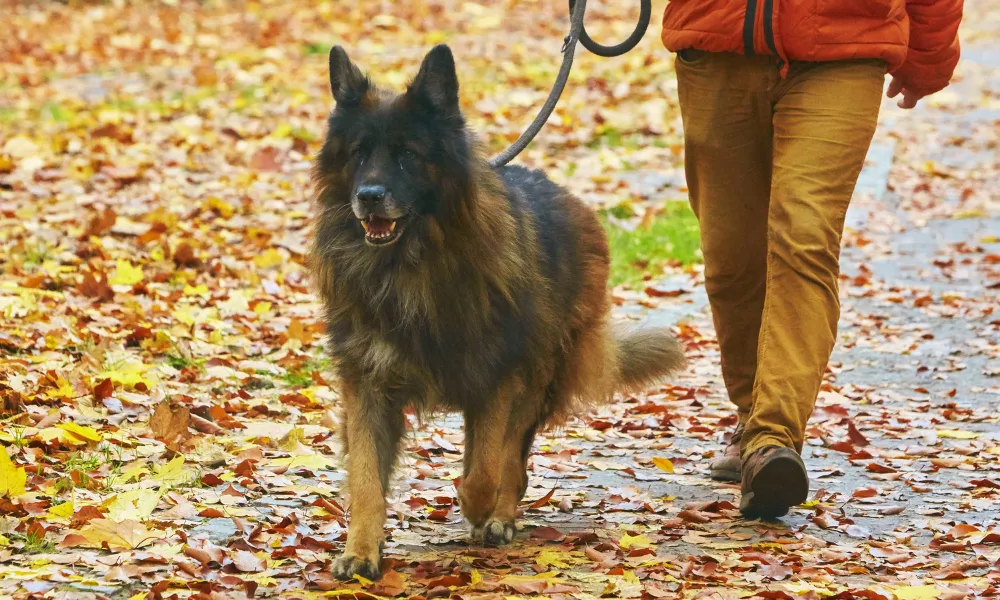
02. The Right Gear: Collar, Harness, and Leash
A harness, especially one designed for active dogs, is generally better for German Shepherds than a collar. It provides more control and reduces strain on their neck.
Choose a harness that fits snugly but comfortably, ideally with a handle on the back for added control in busy areas. Related: Dog Collars, Leashes, and Harnesses.
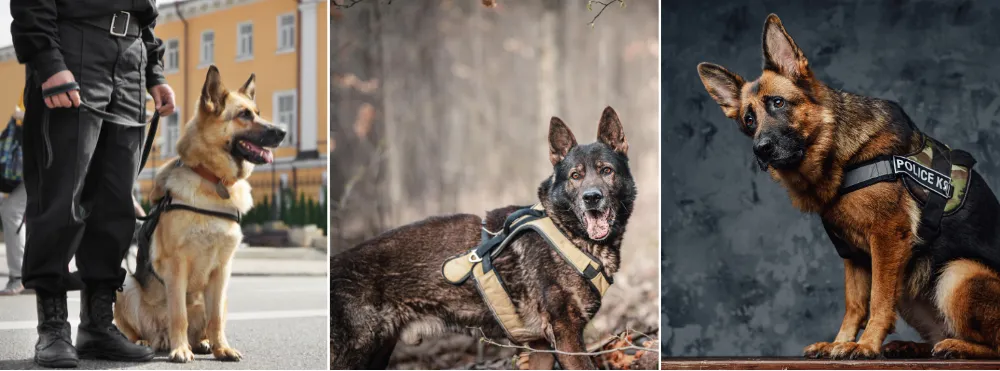
A sturdy regular leash between 4-6 feet long is best. Look for a leash with a comfortable grip and strong material to withstand your dog’s strength.
Retractable leashes are not recommended for German Shepherds. Do you want to know why? Read our article:
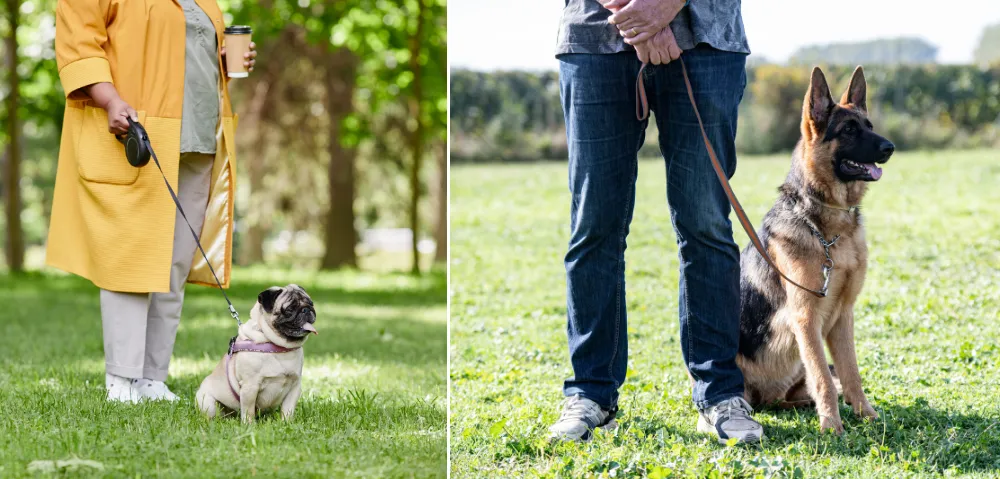
03. Start with Obedience Training
Before going on longer walks, ensure your German Shepherd is familiar with basic commands, especially heel, sit, stay, and leave it.
This training is crucial for keeping them focused on you and preventing them from getting overly distracted by other animals or people. Practicing these commands during walks will also give your dog mental stimulation.
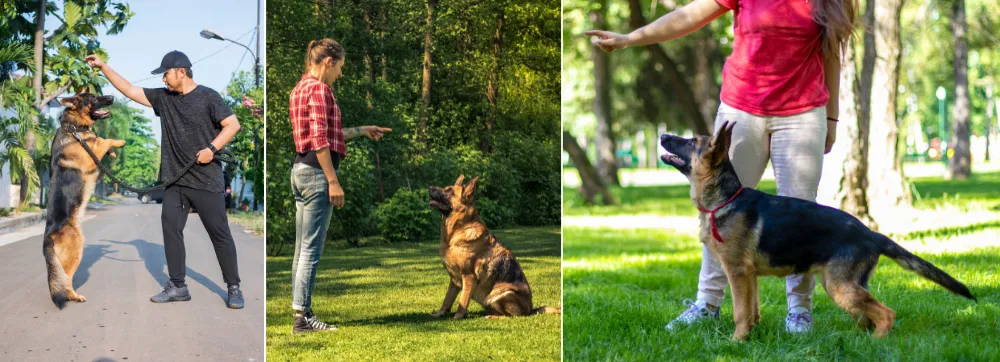
04. Incorporate Warm-ups and Cool-downs
German Shepherds are athletic and can benefit from a short warm-up and cool-down routine:
- Warm-up: Begin with a slow, 5-minute walk, letting your dog sniff and adjust to the environment.
- Cool-down: After the main part of your walk, slow down to a leisurely pace and allow your dog to relax and cool off. This is especially important after intense play or running.

05. Structured Walking: How to Prevent Pulling
German Shepherds are strong, and if left unchecked, they may pull on the leash, especially when excited.
Here are some techniques to prevent pulling:
- Teach the Heel Command: Walk with your German Shepherd at your side, holding a treat close to your body. Reward them when they stay by your side. Over time, practice this without treats to make sure they understand the command.
- Change Directions Often: If your dog starts to pull, change directions to get their attention back on you. This teaches them to stay alert and responsive to your cues.
- Use a Gentle Leader if Needed: For dogs that continue to pull despite training, a Gentle Leader or Head Collar can offer more control. However, only use it as a temporary training aid and always consult with a trainer for proper fitting.
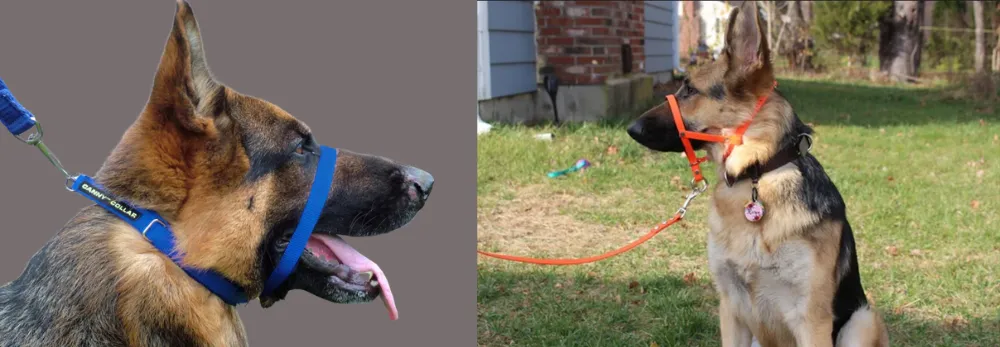
RELATED
- German Shepherd Energy Levels by Age | Activity Needs
- German Shepherd Running Abilities: Speed, Distance, Endurance
- How Do German Shepherds Handle Hot Weather
- Ultimate Guide to German Shepherds Water Activities
- How to Give German Shepherd a Bath: A Complete Guide
- Should You Shave a German Shepherd in Summer?
06. Plan for Mental Stimulation
A German Shepherd needs more than just a physical workout; they thrive on mental challenges.
Here are some ways to give mental stimulation to German Shepherds:
- Vary the Route: Switch up your walking route to keep things interesting and expose your dog to different environments, sights, and smells. This keeps them curious and engaged.
- Incorporate Commands and Tricks: Every few minutes, ask your German Shepherd to sit, stay, or perform a trick like shaking hands. This keeps them mentally stimulated and reinforces training.
- Allow Some Exploration Time: German Shepherds love to sniff and explore, so designate parts of the walk for structured exercise and other parts for free exploration.
07. Address Common Distractions
German Shepherds have a strong prey drive and are naturally alert, which means they can become easily distracted by other animals, bicycles, or runners.
Here are some ways to address common distractions:
- Stay Calm and Lead Confidently: Your dog takes cues from your behavior, so if you stay calm and confident when encountering a distraction, they’re more likely to remain calm.
- Practice the “Leave It” Command: This is essential for preventing your dog from lunging at small animals or chasing moving objects. With treats as motivation, practice “leave it” during walks until they consistently respond.
- Reward Focus on You: Reward your dog with treats when it ignores distractions and focuses on you, reinforcing positive behaviors. Related: Dog Treats.
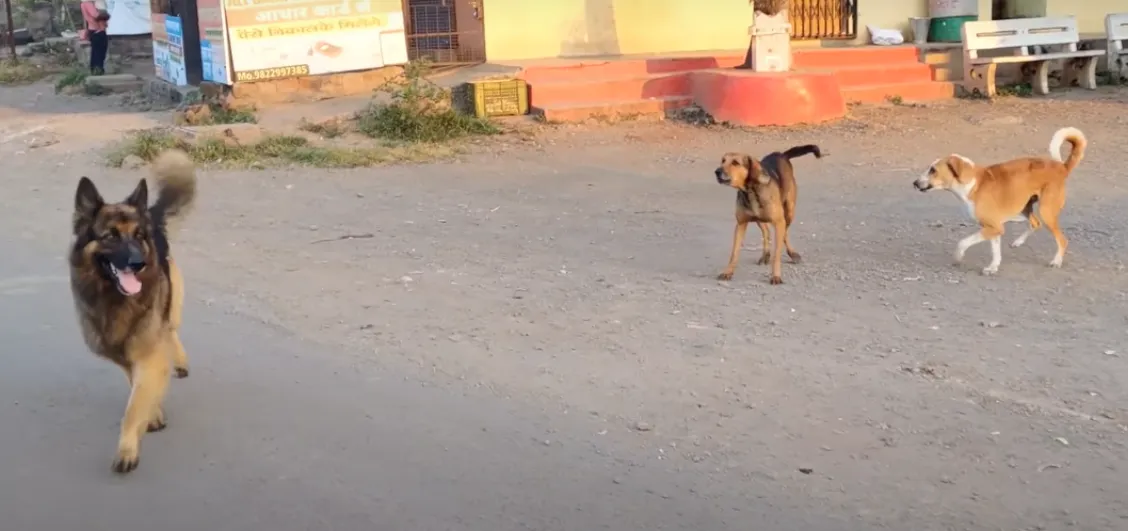
08. Safety Tips
Here are some important safety tips to follow:
- Avoid High-Heat Hours: German Shepherds can overheat easily due to their thick coat. Walk during cooler times of the day, such as early morning or evening, especially in hot weather.
- Check Their Paws: After the walk, check your German Shepherd’s paws for any signs of irritation, cuts, or foreign objects. Paws can be sensitive to rough surfaces, especially in extreme temperatures.
- Hydrate Regularly: Bring water along for longer walks, and make sure to stop for water breaks, especially if they are engaging in vigorous activity.
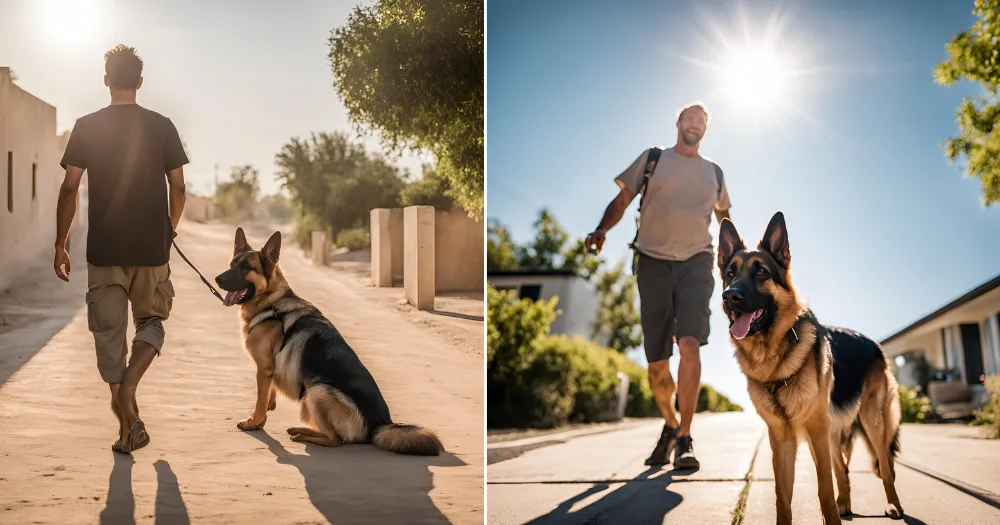
09. Socialization During Walks
German Shepherds are naturally protective, so it’s important to socialize them around other people and animals.
- Controlled Introductions: Allow your dog to observe new people or dogs from a distance before approaching. Over time, this will reduce their protective instincts and help them feel comfortable.
- Reward Calm Behavior: Reward your German Shepherd with treats or praise when they remain calm around other animals or people.
10. Consistency is Key
Consistency is one of the most important aspects of your German Shepherd walks.
Establish a routine that includes:
- Regular walk times
- Consistent commands and expectations
- Scheduled days for longer walks or more intense activities
Final Thoughts
Walking a German Shepherd is a rewarding experience that builds a stronger bond between you and your dog while keeping them healthy and happy. By following these guidelines, you’ll ensure your German Shepherd gets the physical exercise, mental stimulation, and socialization they need to thrive. With patience, training, and consistency, your German Shepherd will look forward to every walk and develop into a well-mannered, balanced companion.
If you like this post then don’t forget to share with other people. Share your feedback in the comments section below.
Also Read
- Male or Female German Shepherd: Which One is Better?
- How to Determine the Age of German Shepherd Puppy or Dog
- How to Know German Shepherd Puppy is Male or Female | Gender
- Is German Shepherd Right for Apartment Living?
- Role of German Shepherds in Therapy & Emotional Support

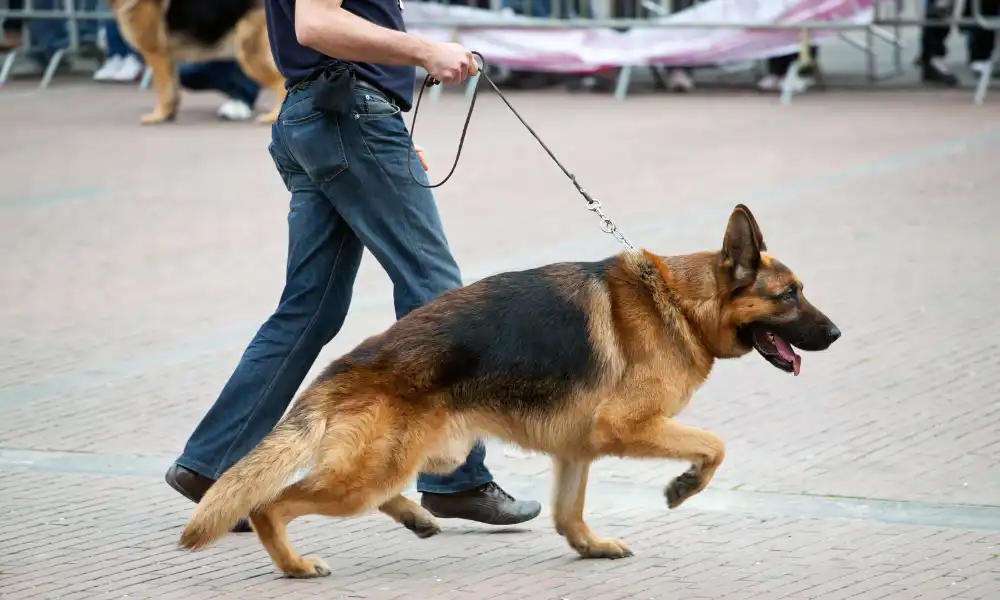


Leave a Reply